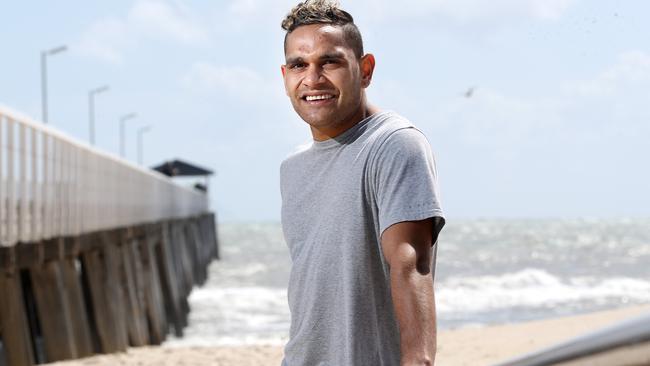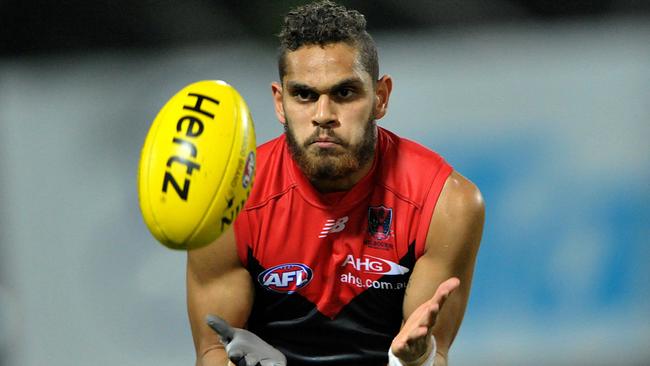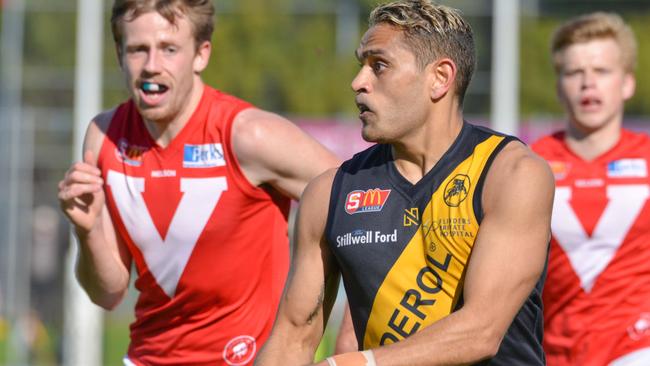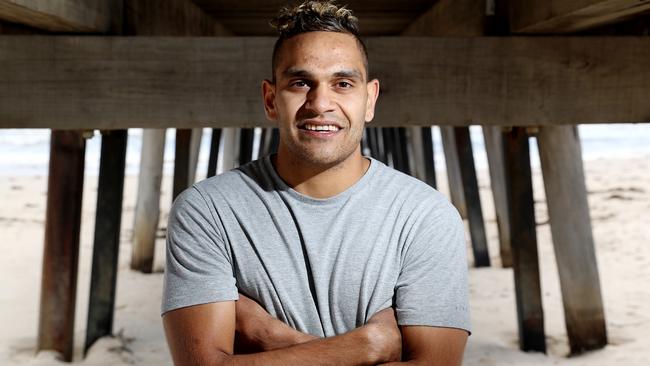Tony Armstrong explains why Dom Barry was never going to be a star at Melbourne
IF Dom Barry shines for Port Adelaide, Melbourne fans should not feel aggrieved. TONY ARMSTRONG explains why Barry was never going to be a star with the Demons.

AFL News
Don't miss out on the headlines from AFL News. Followed categories will be added to My News.
IF Dom Barry shines for Port Adelaide next year, Melbourne fans should not feel aggrieved.
Barry was never going to be a star with the Demons.
The highly touted left-footer arrived at Melbourne via the 2012 draft with an abundance of talent and a great attitude.
But he prematurely ended his time there — not because he was not good enough, but because he needed to “find” himself culturally.
TONY ARMSTRONG: WHAT PLAYERS FEEL ON DRAFT NIGHT
TONY ARMSTRONG: INSIDE PRE-SEASON TRAINING
TONY ARMSTRONG: PRESSURE GROWING ON YOUNG STARS
He needed to go home.
This is not to blame Melbourne, because the club has had a strong connection with indigenous players in recent times. This was all about Barry’s headspace.
He was clearly settled on the field; he had just signed a two-year contract extension because the level of football he was playing was good enough to warrant that. Unfortunately, he wasn’t settled off the field.

Indigenous footballers walk between three worlds — they have their culture (the oldest surviving culture in the world), the westernised world, and the highly professional environment of the AFL or AFLW.
Their identity falls somewhere in the middle, and if they can’t find the balance it affects their ability to do what they want. It is a reality that faces a number of indigenous players who are lost to the game.
In Barry’s case, it’s clear that his culture — and his close connection to family — was pulling him home.
So he bravely walked away from a potentially lucrative career in the country’s most popular sport.
I think it’s an absolute credit to Barry that he put his mental health and culture first.
He went back to the Anangu Pitjantjatjara Yankunytjatjara lands, splitting his time between there, Darwin and Alice Springs.
Being an Aboriginal and Torres Strait Islander, you need to be totally comfortable with yourself and your aboriginality before you find yourself in the right head space.

For me, being indigenous has been such a big part of my life that until I became comfortable with it, I could barely speak about it. And this is off the back of being brought up by my amazing non-indigenous mother.
Barry obviously could not resist the pull to go home and immerse himself in his old surrounds — connect with his land, his people, and himself. So that’s what he did.
He spent his time driving a school bus, mentoring and tutoring the kids, and developed a passion for education. He also clearly learnt more about his people, their past and present, and what that meant for him.
I say this because he felt secure enough — in his identity and self — to move down to Adelaide to start a teaching degree.
It was only after doing all of these things, and playing football for Glenelg, that Barry was able to get near the level needed to make an unlikely return to the AFL.
He declared himself ready, and was drafted by Port Adelaide.

It is incredibly rare that players are given a second chance at AFL level, especially when they leave for reasons such as Barry’s.
But he needed that time away from the game to find himself, and while clubs would be supportive of that, I don’t think he would have found himself while still in the system.
It is an important thing to understand — because we bang on about footy like it is the be-all and end-all, which can be unhealthy.
I think now, and only now, Barry is ready to take on the AFL with a clear mind and strong sense of identity, which will hold him in good stead for the rest of his career.
TONY ARMSTRONG PLAYED 35 GAMES FOR ADELAIDE, SYDNEY AND COLLINGWOOD FROM 2010-15
Originally published as Tony Armstrong explains why Dom Barry was never going to be a star at Melbourne

